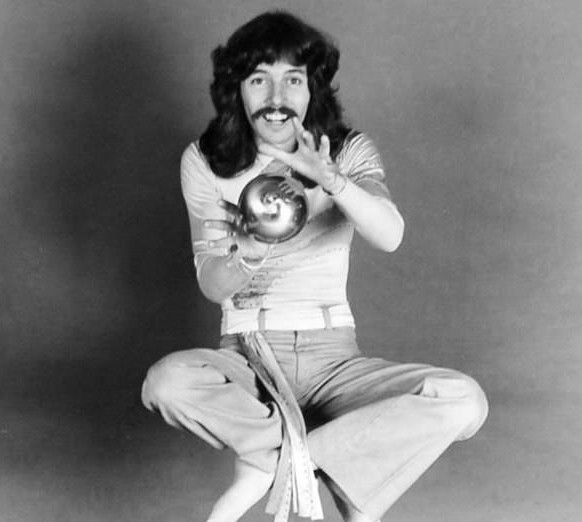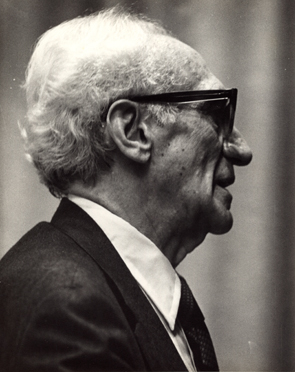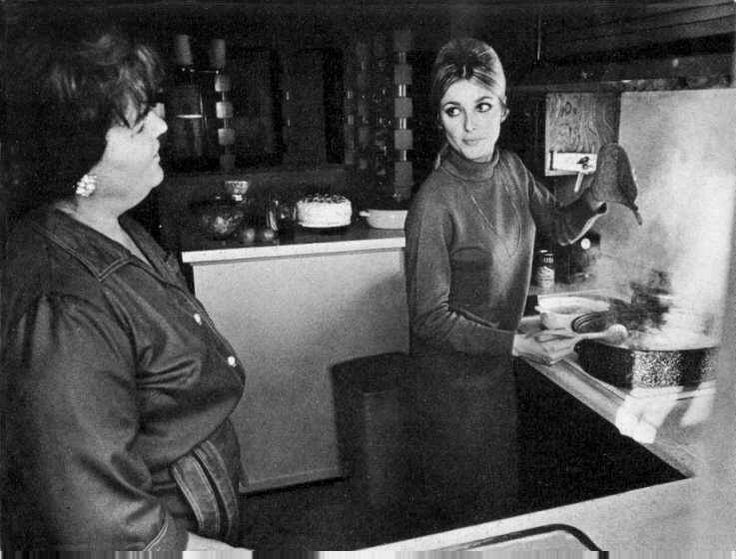Years before he was to become a Hollywood heavyweight, Ivan Reitman helped launch the career of affable, parody-ready illusionist Doug Henning, who came to attention in Canada with the stage performance Spellbound. Relocated to Broadway in the mid-1970s and rechristened The Magic Show, it was a long-running sensation. After a break from the NYC boards and some permutations in his personal life, Henning tried, with disastrous results, to recapture the old magic with his 1983 creation, Merlin. Before it was delivered a death blow to the stomach, à la Houdini, by indifferent audiences, Henning was profiled by Mary Vespa of People. The opening:
Doug Henning learned one of his most valuable tricks not from another magician but from the manager of the famous mime Marcel Marceau: “Keep yourself scarce.” He has. Though he’s been doing his annual NBC-TV specials for eight years now, and frequently takes his act on the road, he hasn’t set foot on Broadway since The Magic Show, the popular revue that established him as big box office when he starred in it from 1974 to 1977. Now he’s back, this time with Merlin, a musical with a $4 million budget, lavish sets, stunning effects and stunts on a scale that, he says, “staggers the imagination.”
Indeed, the Mark Hellinger Theater has never seen quite such goings-on. There is exotic music. Beautiful women emerge from fire, burst into a constellation of stars, disappear into thin air. Chita Rivera, as the evil queen intent on doing in the young Merlin (Henning) before he meets the future King Arthur, changes a black panther into a temptress who tries to distract him from his magic. But Henning survives this and other hazards—at one point he disappears from a flaming cage being lifted above the stage—to triumph in the end.
Whether all this will dazzle the critics won’t be clear until the show, now playing to preview audiences, opens on Jan. 9. But for Henning, at least, Merlin is already a milestone that is not only professional but personal: The show’s water spirit, a lithe brunette dream woman he levitates above a fountain, is in fact a new wife who’s given him a badly needed lift.
Cut to 1981. Henning was trying to bounce back from a busted marriage. Exhausted after doing one of his TV shows, he retreated to a favorite haunt, the Transcendental Meditation Center at Maharishi International University in Fairfield, Iowa. “Doug was just so sad and lonely,” recalls friend Jim Bagnola. “It seemed as though he was achieving all his goals and still remaining unfulfilled.” Call it luck. Timing. Or was it life playing a trick on a superillusionist? There, at a banquet, he met a beauty who would sweep away his woes like, well, magic.
“My friends said there was practically a flash of light,” says Henning, 35. “I had never felt anything like it in my whole life.” The dazzler was Debby Douillard, 27, an abstract painter with bottomless blue eyes who was taking classes at the university and also had just separated from her spouse. She, too, felt Cupid’s bolt: “It was like I blossomed right on the spot.”
They got engaged within the week and wed last December. He still marvels at the sorcery she’s worked on him. “When I perform, I could love a million people,” Henning admits, “but I had trouble loving one person. I would separate love and sex. Debby’s helped me overcome my fear of intimacy.” Her problem was shyness, and Henning’s Rx has been to use her not only in Merlin but also on tour, where she performs as a singer, dancer and his assistant. “I have a tendency to be inward,” says Debby. “Doug’s turning me inside out. Sometimes it’s painful, but it’s a great growing experience.”•
Not content with merely being a magus, Henning also founded a political organization, The Natural Law Party, which helped him lose elections very badly in both the UK and Canada. Sometimes democracy works.
______________________________
Immanuel Velikovsky was an outsider scientist whose work was impressively elaborate nonsense. “Astronomers at Harvard consider the sensational theory of Dr. Immanuel Velikovsky that the earth stood still a couple of times in Biblical days sheer nonsense,” noted Popular Science in 1950. A charismatic guy, he nonetheless managed to befriend some of the greatest minds of the 20th century, including Albert Einstein, Carl Sagan and Freeman Dyson. In a New York Review of Books piece, Dyson recalled their friendship. An excerpt:
After I came to America, I became a friend of Immanuel Velikovsky, who was my neighbor in Princeton. Velikovsky was a Russian Jew, with an intense interest in Jewish legends and ancient history. He was born into a scholarly family in 1895 and obtained a medical degree at Moscow University in 1921. During the chaos of the Bolshevik Revolution he wrote a long Russian poem with the title “Thirty Days and Nights of Diego Pirez on the Sant Angelo Bridge.” It was published in Paris in 1935. Diego Pirez was a sixteenth-century Portuguese Jewish mystic who came to Rome and sat on the bridge near the Vatican, surrounded by beggars and thieves to whom he told his apocalyptic visions. He was condemned to death by the Inquisition, pardoned by the pope, and later burned as a heretic by the emperor Charles V.
Velikovsky escaped from Russia and settled in Palestine with his wife and daughters. He described to me the joys of practicing medicine on the slopes of Mount Carmel above Haifa, where he rode on a donkey to visit his patients in their homes. He founded and edited a journal, Scripta Universitatis atque Bibliothecae Hierosolymitanarum, which was the official journal of the Hebrew University before the university was established. His work for the Scripta was important for the founding of the Hebrew University. But he had no wish to join the university himself. To fulfill his dreams he needed complete independence. In 1939, after sixteen years in Palestine, he moved to America, where he had no license to practice medicine. To survive in America, he needed to translate his dreams into books.
Eleven years later, Macmillan published Worlds in Collision, and it became a best seller. Like Diego Pirez, Velikovsky told his dreams to the public in language they could understand. His dreams were mythological stories of catastrophic events, gleaned from many cultures, especially from ancient Egypt and Israel. These catastrophes were interwoven with a weird history of planetary collisions. The planets Venus and Mars were supposed to have moved out of their regular orbits and collided with the Earth a few thousand years ago. Electromagnetic forces were invoked to counteract the normal effects of gravity. The human and cosmic events were tied together in a flowing narrative. Velikovsky wrote like an Old Testament prophet, calling down fire and brimstone from heaven, in a style familiar to Americans raised on the King James Bible. More best sellers followed:Ages in Chaos in 1952, Earth in Upheaval in 1955, Oedipus and Akhnaton in 1960. Velikovsky became famous as a writer and as a public speaker.
In 1977 Velikovsky asked me to write a blurb advertising his new book, Peoples of the Sea. I wrote a statement addressed to him personally:
First, as a scientist, I disagree profoundly with many of the statements in your books. Second, as your friend, I disagree even more profoundly with those scientists who have tried to silence your voice. To me, you are no reincarnation of Copernicus or Galileo. You are a prophet in the tradition of William Blake, a man reviled and ridiculed by his contemporaries but now recognized as one of the greatest of English poets. A hundred and seventy years ago, Blake wrote: “The Enquiry in England is not whether a Man has Talents and Genius, but whether he is Passive and Polite and a Virtuous Ass and obedient to Noblemen’s Opinions in Art and Science. If he is, he is a Good Man. If not, he must be starved.” So you stand in good company. Blake, a buffoon to his enemies and an embarrassment to his friends, saw Earth and Heaven more clearly than any of them. Your poetic visions are as large as his and as deeply rooted in human experience. I am proud to be numbered among your friends.
I added the emphatic instruction, “This statement to be printed in its entirety or not at all.” A quick response came from Velikovsky. He said, “How would you like it if I said you were the reincarnation of Jules Verne?” He wanted to be honored as a scientist, not as a poet. My statement was not printed, and Peoples of the Sea became a best seller without my help. We remained friends, and in that same year he gave me a copy of his Diego Pirez poem, which I treasure as the truest expression of his spirit. I hope it will one day be adequately translated into English.•
A 1972 CBC doc about the Velikovsky and his catastrophist claptrap.
______________________________
Here’s an oddity: In 1991, Doris Tate, mother of actress Sharon Tate who was among those murdered by the Manson Family, appeared on To Tell the Truth hosted by Alex Trebek. The elder Tate became a campaigner for the rights of crime victims. This short-lived iteration of the venerable game show, which had a harder, more provocative edge than such fare usually has, provided a platform for Tate’s work. She passed away the following year as a result of a brain tumor.



